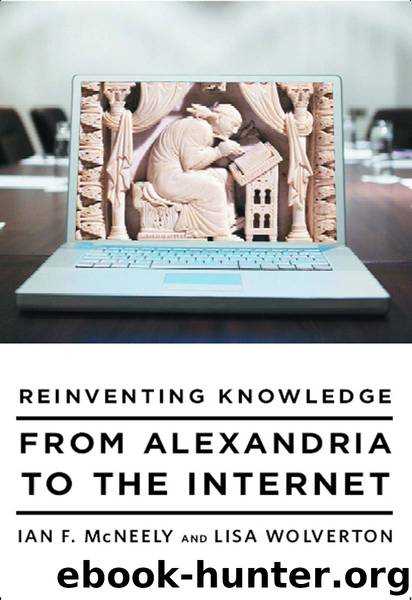Reinventing Knowledge by Ian F. McNeely

Author:Ian F. McNeely
Language: eng
Format: epub
Publisher: W. W. Norton & Company
Published: 2008-05-05T16:00:00+00:00
5
The Disciplines
1700–1900
EVANGELICAL PROTESTANTS AND SECULAR HUMANISTS COMBINED TO CREATE THE FIRST NATIONAL SYSTEM OF MASS PUBLIC EDUCATION, AND WITH IT A NEW MARKET FOR ACADEMIC SPECIALTIES.
THE ENLIGHTENMENT produced the West’s first mass market for knowledge and with it the specialization of intellectual labor we call the disciplines. No less a free marketeer than Adam Smith explained the connection. Writing in The Wealth of Nations (1776), Smith argued that the “subdivision of employment in philosophy, as well as in every other business, improves dexterity, and saves time.” Knowledge he saw as a commodity, its production a form of industrial labor, its progress additive and cumulative. As “each individual becomes more expert in his own peculiar branch, more work is done upon the whole, and the quantity of science is thereby increased.”1 Disciplines, to Smith, were an artifact of scholars’ seeking a niche in the marketplace of ideas. This cheery capitalist vision comported well with the modern, secular, competitive arena the Republic of Letters had become by the eighteenth century.
By Smith’s time, some of Europe’s most market-savvy intellectuals had taken on the effort to collect, organize, and disseminate knowledge from the Republic of Letters. Despite widespread censorship, publishers catalyzed an eighteenth-century “reading revolution” enveloping all social classes in widening literacy. Enlightenment thinkers therefore put their faith in the written word to bring useful knowledge to a mass readership. Significantly, they wrote in vernaculars, which soon overtook Latin as languages of scholarship. Ephraim Chambers, writing in English, and Pierre Bayle, writing in French, compiled encyclopedias, dictionaries, and newsletters to popularize discoveries from the various branches of learning. The creators of the best-selling French Encyclopédie gathered together all the arts, sciences, and even crafts in 71,818 articles. Among its 2,885 copperplate engravings were diagrams showing how to build a mine and assemble a clock. Entries were arranged not by subject but alphabetically, from A to Z, with an elaborate system of cross-references that invited readers to piece together information through leaps of common sense. Of all the books produced between 1500 and 2000, none aimed more sincerely to “assemble all knowledge scattered on the surface of the Earth,” in the words of its coeditor, Denis Diderot.2 Encyclopedias were only the most prominent among many new genres meant to commercialize Enlightenment for the people, including newspapers, journals, intelligencers, almanacs, travelogues, and even novels. Think of Benjamin Franklin, the humble print-shop typesetter, self-educated through voracious reading, who made a famously profitable career publishing his practical wisdom and inventions.
Yet the trumpeters of print capitalism never succeeded in replacing the hierarchy that attends face-to-face learning. Seekers of knowledge today do not simply furnish themselves with a set of quality encyclopedias and venture forth into the world. They must instead submit to years and years of schooling. Top acolytes consecrate their careers to particular fields of research, such as history, chemistry, and psychology. In a surprising rebuke to the bellwethers of laissez-faire in Western Europe, it was underdeveloped, impoverished Germany, at the moment of its defeat by Napoleon, that
Download
This site does not store any files on its server. We only index and link to content provided by other sites. Please contact the content providers to delete copyright contents if any and email us, we'll remove relevant links or contents immediately.
Cecilia; Or, Memoirs of an Heiress — Volume 1 by Fanny Burney(32536)
Cecilia; Or, Memoirs of an Heiress — Volume 2 by Fanny Burney(31933)
Cecilia; Or, Memoirs of an Heiress — Volume 3 by Fanny Burney(31925)
The Great Music City by Andrea Baker(31908)
We're Going to Need More Wine by Gabrielle Union(19028)
All the Missing Girls by Megan Miranda(15915)
Pimp by Iceberg Slim(14476)
Bombshells: Glamour Girls of a Lifetime by Sullivan Steve(14046)
For the Love of Europe by Rick Steves(13846)
Talking to Strangers by Malcolm Gladwell(13339)
Norse Mythology by Gaiman Neil(13331)
Fifty Shades Freed by E L James(13227)
Mindhunter: Inside the FBI's Elite Serial Crime Unit by John E. Douglas & Mark Olshaker(9310)
Crazy Rich Asians by Kevin Kwan(9271)
The Lost Art of Listening by Michael P. Nichols(7485)
Enlightenment Now: The Case for Reason, Science, Humanism, and Progress by Steven Pinker(7303)
The Four Agreements by Don Miguel Ruiz(6735)
Bad Blood by John Carreyrou(6608)
Weapons of Math Destruction by Cathy O'Neil(6257)
